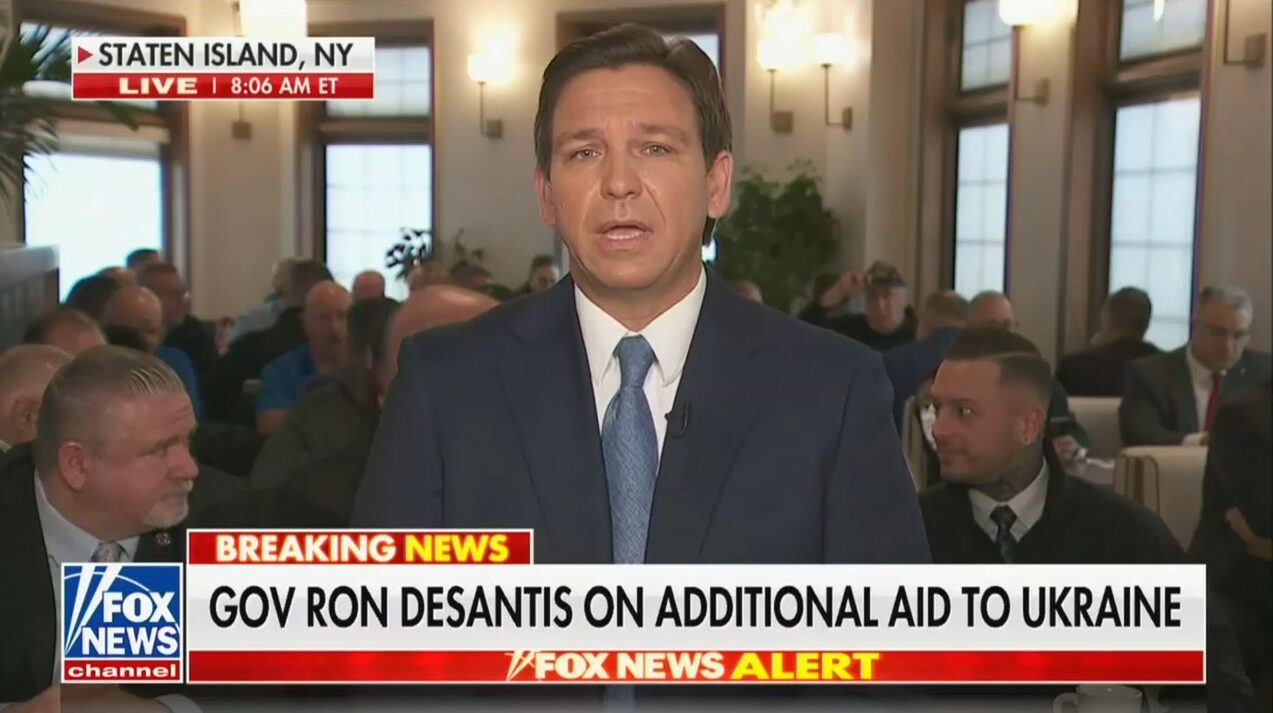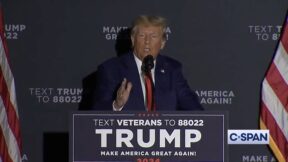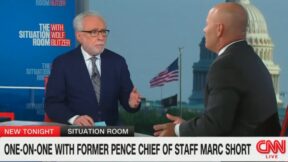DeSantis Can’t Beat Trump By Parroting His Incoherent and Submissive Ukraine Policy

Florida Governor Ron DeSantis (R) put a stake in the ground on Monday, expressing skepticism over the U.S. role in the war in Ukraine.
When asked by Fox News host Tucker Carlson if opposing Russia in Ukraine is “in America’s interest,” DeSantis delivered the following statement:
While the U.S. has many vital national interests – securing our borders, addressing the crisis of readiness within our military, achieving energy security and independence, and checking the economic, cultural, and military power of the Chinese Communist Party – becoming further entangled in a territorial dispute between Ukraine and Russia is not one of them. The Biden administration’s virtual “blank check” funding of this conflict for “as long as it takes,” without any defined objectives or accountability, distracts from our country’s most pressing challenges.
When asked to articulate what U.S. aims in the conflict should be, he replied:
Without question, peace should be the objective. The U.S. should not provide assistance that could require the deployment of American troops or enable Ukraine to engage in offensive operations beyond its borders. F-16s and long-range missiles should therefore be off the table. These moves would risk explicitly drawing the United States into the conflict and drawing us closer to a hot war between the world’s two largest nuclear powers. That risk is unacceptable.
His answers reflect a turn away from his own instincts and toward those of his chief rival for the 2024 Republican presidential nomination, former President Donald Trump.
For most of his political career, DeSantis has advocated for American leadership on the world stage and an unmuted opposition to those who would challenge it, including Russian dictator Vladimir Putin. In 2015, for example, he lamented the Obama administration’s failure to provide lethal aid to the Ukrainians. Later, he praised the Trump administration for reversing that perceived mistake.
“A couple years ago, Obama was refusing to provide lethal aid to Ukraine, they were trying to do a reset. The Democrats lauded that. They viewed guys like me who are – who are more of the Reagan school that’s tough on Russia as kind of throwbacks to the Cold War. They criticized Mitt Romney in 2012. Now all of a sudden because they’re using it against Trump, they’re so concerned about Russia,” said DeSantis in 2017.
Even just a year ago, DeSantis struck a much different tune than he did in his written answers to Carlson.
“I was heartened to see them [the Ukrainians] having some moxie to fight back,” remarked the governor in February 2022, before knocking the Biden administration for not having “done enough… to really hit Putin where it hurts.”
DeSantis’s heel-turn toward Trump’s more skeptical tack is a mistake on the merits and politics, though he has doubtlessly been persuaded this is the wisest course of action if he hopes to secure the nomination.
Polling has shown that Republicans have grown increasingly skeptical of the war in Ukraine. In March 2022, 42 percent of Republicans said the U.S. was not doing enough to help Ukraine, while 32% said it was, and 7% said it was doing too much according to Pew Research. By the end of January 2023, those numbers were 17%, 24%, and 40%.
That’s a dramatic shift in the isolationist direction, but not enough to say definitively that Republicans as a whole favor abandoning Ukraine — a slight majority are still backing U.S. support for the battered country.
Moreover, the movement doesn’t reflect an inevitability, but a consequence of a deliberate effort of some on the right. Trump has repeatedly and hysterically warned that the U.S.’s efforts could lead to “World War III” and “oblivion.” Carlson has accused Ukrainian leader Volodymyr Zelensky of “anti-Christian despotism.” It’s these irritable smears, not an inescapable gravitational pull, that has pushed Republicans away from Ukraine’s righteous cause.
DeSantis has a choice, then: He can play “follow the leader” and be charged — not unfairly — with having peeked over Trump’s shoulder for the answers, or he can draw a favorable distinction with Trump on an issue of grave importance.
The former will bring about a self-fulfilling prophecy. DeSantis thinks Republican skepticism of Ukraine is inevitable and so he endorses it. Republicans are left with no reason to think that that isn’t the conservative position; most of the party’s elders and elites will have lined up behind it. It will also put him at a strategic disadvantage, as he’ll never be able to outdo Trump or convince those of his mind that he is the more dovish candidate.
The latter, on the other hand, will set him up for an argument with Trump on which DeSantis will hold the high ground. He can critique Trump’s kind words for not just Putin, but China’s Xi Jinping and North Korea’s Kim Jong Un. He can point out that China, a country both he and Trump have identified as the United States’s chief geopolitical competitor, has supported Russia’s aggression.
And he will be freed from the heavy burden of having to issue the kind of painfully contorted statement he gave to Carlson. In one breath, DeSantis called the invasion a “territorial dispute” and in the next he preached the importance of not helping Ukraine engage in military operations “beyond its borders.” The contradiction reflects the unnatural effort of hawkish Reaganite to play the part of contrarian Buchananite.
What’s more is that DeSantis can set up himself up for success in a general election against Joe Biden by staying true to his previously stated principles. A substantial majority of Americans still support Ukraine, and it would be far easier to critique Biden for his failure of deterrence in the conflict, as well as the disastrous withdrawal from Afghanistan, if he himself champions American strength rather than submissiveness.
DeSantis is a candidate to lead the Republican Party for the next 2, 6, or 10 years. On so many other issues, he has been an unapologetic example-setter — that’s what’s brought him to this point. On Ukraine, he should follow his own example, reject Trump’s cartoonish one, and once again show he’s up to the task of leading.
This is an opinion piece. The views expressed in this article are those of just the author.




